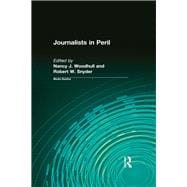| Preface | xiii | ||||
| Part I: Overview | 3 | (12) | |||
|
3 | (12) | |||
|
|||||
| Part II: Reporting from War Zones | 15 | (24) | |||
|
15 | (6) | |||
|
|||||
|
21 | (6) | |||
|
|||||
|
27 | (6) | |||
|
|||||
|
33 | (6) | |||
|
|||||
| Part III: Government Repression | 39 | (46) | |||
|
39 | (8) | |||
|
|||||
|
47 | (2) | |||
|
|||||
|
49 | (8) | |||
|
|||||
|
57 | (8) | |||
|
|||||
|
65 | (6) | |||
|
|||||
|
71 | (4) | |||
|
|||||
|
75 | (10) | |||
|
|||||
| Part IV: Civil Unrest | 85 | (16) | |||
|
85 | (6) | |||
|
|||||
|
91 | (10) | |||
|
|||||
| Part V: Organized Crime | 101 | (14) | |||
|
101 | (6) | |||
|
|||||
|
107 | (8) | |||
| Part VI: Portfolio | 115 | (10) | |||
|
115 | (10) | |||
|
|||||
| Part VII: Solutions | 125 | (22) | |||
|
125 | (8) | |||
|
|||||
|
133 | (6) | |||
|
|||||
|
139 | (8) | |||
|
|||||
| Part VIII: Interviews | 147 | (16) | |||
|
147 | (2) | |||
|
149 | (4) | |||
|
153 | (4) | |||
|
157 | (2) | |||
|
159 | (4) | |||
| Part IX: Review Essay | 163 | (10) | |||
|
163 | (10) | |||
|
|||||
| For Further Reading | 173 | (2) | |||
| Index | 175 |








